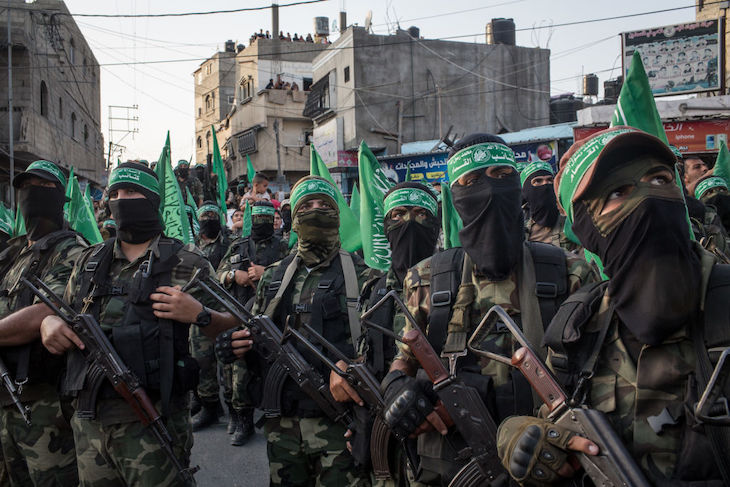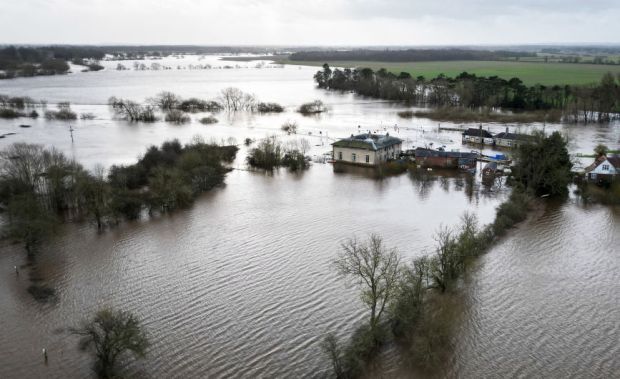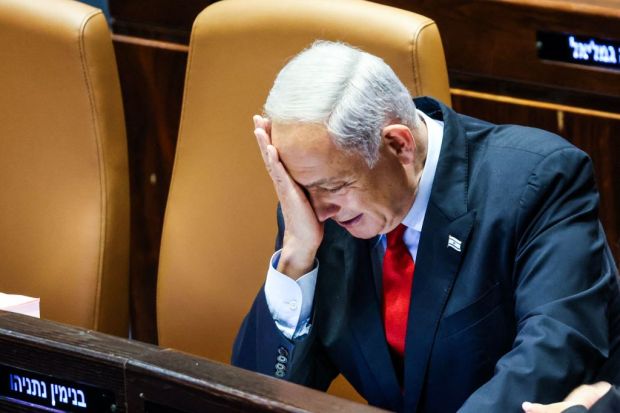It would be hard to imagine that almost exactly six months after October 7, I would find myself saying this, but Israel is either on a path to defeat or has lost the war already.
The way in which the Jewish state – the regional military superpower, enjoying huge military support from the global superpower – is being forced to snatch defeat from the jaws of victory is a cautionary tale for the West. It is often correctly said that Israel is on the frontline of the struggle against jihadism. Well, pay attention: the collapse of Israel’s campaign in Gaza, which after the October atrocities was the most justified imaginable, is a harbinger of what may lie ahead.
Let’s look at the facts on the ground. At the height of the war, there were hundreds of thousands of troops in Gaza. This week, however, almost all Israeli forces were withdrawn, leaving behind only 1,000 combat troops from the Nahal Brigade. They are deployed only along the narrow Netzarim corridor, which bisects Gaza from east to west to prevent Hamas creeping north. The southern portion of the Strip, from Rafah on the Egyptian border to Khan Yunis – where the 98th commando division sacrificed many lives to root out Hamas and pursue a fruitless search for its leader, Yahya Sinwar – has been abandoned to the jihadis. And there remain pockets of Hamas in the north.
The official Israeli line is that all this is simply a regrouping tactic to prepare for a future invasion of Rafah, which is backed by most Israelis. This is not out of some bloodlust: Israel understands that without taking Rafah, Hamas will simply return and repeat October 7. In the words of a senior Israeli politician, you can’t extinguish 80 per cent of a fire.
In a desperate attempt to steady his restive coalition and calm the voting public, Benjamin Netanyahu claimed to have set a date for the Rafah operation, once the troops are ready. But few people believe him. It is now very difficult to see how this can ever take place.
With Hamas once again taking control of the south, Israel would need to pull hundreds of thousands of reserves away from their families once again and re-conquer that territory before driving down towards Rafah. In fact, now that the troops have left, the jihadis are already returning.
Just hours after the exhausted men of the 98th division pulled out of Khan Yunis, a barrage of rockets was fired at Israel from the freshly vacated town. This is a hint of the scale of the challenge that the withdrawal has created.
Once the south was secured again, the IDF would need to evacuate the 1.4 million people Hamas is using as a human shield from Rafah and direct them to a safe zone in the coastal area, which would also require construction. With the cooperation of which aid agency exactly? And with which international allies? The Biden administration has now set its face openly against a Rafah invasion, and even if manoeuvres are delayed until November, the nature of Donald Trump’s support remains an open question. It is true that the Americans sent thousands of bombs and a fleet of F-35 fighter planes to Israel a few weeks ago, but this was an order that had been placed years before. It forms no guarantee of future provisions. The war, with its relentless propaganda from the other side, has made supporting Israel more toxic than it has ever been.
After six months of blood and tears, what is the result? Huge destruction in Gaza and the partial conquest of the north. But more than 130 hostages remain in captivity and Hamas, while degraded, is far from destroyed. At least four battalions remain operational in Rafah and Sinwar is still at large. As I type, Israeli families are altering their everyday plans for fear of a retaliation from Tehran to the recent IDF operation in Syria, which killed a senior Iranian terrorist. Hezbollah, with the largest missile arsenal in the region, continues to rain rockets on the Jewish state and dig in for a future war, and tens of thousands of Israelis are displaced from the northern border, living in hotels at the taxpayer’s expense. Gaza lies in ruins; Israel is hated around the world.
This was never about revenge, nor about provoking a regional confrontation. The aim of the war, which Israel never wanted, was to eliminate a genocidal threat on its border. On October 7, it was given no choice. Yet now the gains are being thrown away. For this so many families gave the lives of their sons?
The West must take heed. The epicentre of the other side’s strategy is in Tehran. Last week, the Ayatollah Khamenei held a meeting with Hamas leader Ismail Haniyeh, during which he made the starkest of statements. ‘We have, so far, successfully won the media and PR wars, and have managed to change public opinion across the globe,’ he said. ‘We must continue with this.’ You have to hand it to the jihadists: they never keep their strategy a secret. That’s what makes it even more appalling.
For six months, commentators like me have been constantly warning that Hamas’s strategy is to manipulate public opinion so that Israel’s hands are tied before victory is secured. It does so, we repeated, by excluding numbers of Palestinian combatant dead in its death tolls, which are parroted by journalists and politicians alike. It does so by censoring the footage that comes out of Gaza, allowing the world to see only images of suffering civilians, never suffering terrorists. It does so by relying upon the relationship it has built up over many years with international aid agencies, the United Nations and the global media, all of whom are congenitally biased towards the Palestinians. In the West, we have swallowed this whole.
The counter-narrative – that Israel is taking all possible measures to protect innocent life, that it has been facing an existential war that can only end with the destruction of Hamas if any peace is to be won, that it is on the frontline of the struggle between the free world and jihadism – has been drowned out. The results can be seen in the hundreds of thousands taking to the streets, in the natural assumption in the minds of the public that Israel is perpetrating a ‘genocide’.
Preposterously, this can also be seen in Washington. President Biden himself has begun parroting Hamas’s casualty figures and levelling wild accusations against Israel, accusing it of ‘indiscriminate bombing’ and going ‘over the top’. In recent weeks, there have been a number of attacks on Israel from the Democrats, who now expend almost no energy criticising Hamas. The shift began with the President’s State of the Union address, which in its section on the Middle East focused exclusively on Israel’s conduct. Also came Senate Majority Leader Chuck Schumer’s demands for regime change in Jerusalem, followed by the American abstention at the United Nations, which allowed a hostile resolution to be passed.
On Monday, State Department spokesman Matthew Miller ruled out support for a Rafah attack under any circumstances. Staunch friends of the Jewish state, including Former House Speaker Nancy Pelosi, Senator Tim Kaine and Representative Susan Wild, have all called on the United States to withdraw shipments of arms and ammunition. Even Representative Josh Gottheimer, one of Israel’s most committed supporters, has been voicing criticism over the tragic strike on the aid convoy last week.
From the point of view of Hamas leader Yahya Sinwar, this is a dream come true. His strategy – to resist Israel’s assault until the international community tied its hands – is working wonderfully. What motivation has he to release any hostages now? What leverage is left to the Israelis?
According to reports, Sinwar’s messianic tendencies are now in full flow as he revels in ecstasy underground. This weird trait of his used to be described as ‘pathological or out of touch with reality.’ It now seems anything but.
To be fair to the Americans, beleaguered Benjamin Netanyahu hasn’t made things easy. Far from it. His power rests on the far-right members of his coalition, who have vetoed both attempts to secure more aid for Gaza and any plan for the governance of the Strip that would involve Palestinian forces. On Thursday, a searing telephone conversation with President Biden caused Netanyahu to allow supplies to pass through the Erez crossing and authorise shipments directly from the port of Ashdod, both measures which his far-right bedfellows had blocked. But this is too little, too late. The Americans have been tearing their hair out while demanding better planning from the Israelis, but political deadlock continues to paralyse Jerusalem.
It is true that the IDF – which has fought bravely and effectively, losing relatively few soldiers and keeping civilian casualties relatively low – has been allowing 200 aid trucks a day into the Strip. This is more than was provided before the war (though domestic production has been severely reduced during the hostilities). But specific shipments, of flour for instance, have become snarled up in political brinkmanship. And without a plan for ‘the day after’, the distribution of aid has been chaotic.
A proposal from the defence establishment – which involved the West Bank intelligence chief Majed Faraj selecting 6,000 Fatah men from Gaza for training in Jordan to enable them to secure the Strip – was vetoed by Netanyahu, under pressure from his extremist flank. This was an imperfect solution, but at least it was a solution. Without it, there is a power vacuum which can only be filled by terrorists. The sporadic Hamas attacks even in the north are testament to the fragility of the IDF’s domination when it has no local component. The contrast between the impressive armed forces and their woeful political masters has never looked so stark.
Even this seems outdated now. Netanyahu promised ‘total victory’, saying it was ‘only a step away’. As the troops come home, Hamas celebrates and anti-government protesters take to the streets of Israel in increasing numbers, these words ring especially hollow. Whether the catastrophic political divisions ushered in by Netanyahu led Hamas to launch October 7 is unknown. But it is certain that Israel’s enemies are looking at the rallies on the streets of Tel Aviv and sharpening their knives.
For the West, however, it is the big picture that is of crucial importance. Whatever our frustrations with the appalling administration in Jerusalem, the way in which Washington and London have played out their hostilities in public – and have now apparently deprived Israel of victory – sends a dangerous signal to the world. Whether seen from Tehran, Moscow, Beijing, Pyongyang or Rafah, the message is clear: we may be more powerful than our enemies, but we no longer possess the resilience to stand up to them. Our allies see this equally clearly. Saudi Arabia would only sign a peace accord with Israel if a meaningful American defence pact was on the table. Will they trust such a deal now?
We need to open our eyes, and fast. The war in Gaza is not about Netanyahu. It is not even about Israel in itself. It is about the future of the West. For you and me and our families, the outlook has never looked more dangerous.
Got something to add? Join the discussion and comment below.
Get 10 issues for just $10
Subscribe to The Spectator Australia today for the next 10 magazine issues, plus full online access, for just $10.




















Comments
Don't miss out
Join the conversation with other Spectator Australia readers. Subscribe to leave a comment.
SUBSCRIBEAlready a subscriber? Log in